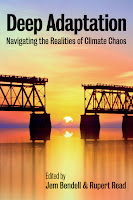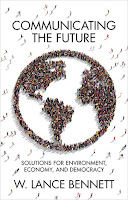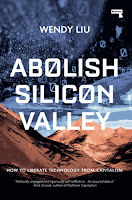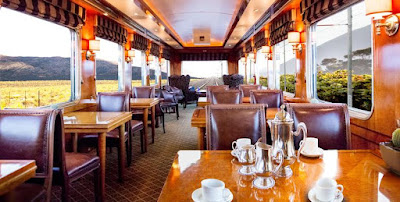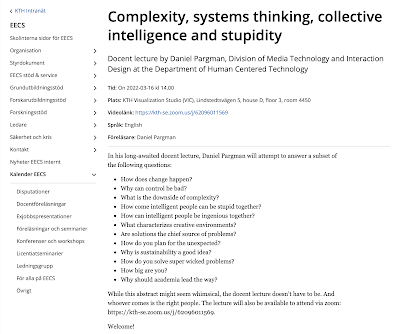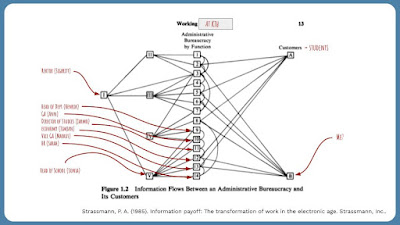.
This blog post summarizes could-have-been blog posts from April, i.e. some of the things that happened in April but that did not merit blog posts of their own (but that could if there had there been fewer other things happening).
I wrote a March roundup blog post a month ago so this the second in the series. It might become a regular genre of blog posts or it might not, the jury is still out.
April Roundup
- Adrian Friday will be a SF Lab Scholar in Residence this autumn (April 1)
Me and Elina sponsored an application from professor Adrian Friday (Lancaster University) to come to KTH later this year and it was approved! The application was sent to the cross-disciplinary research centre
Digital Futures and their
Scholar in Residence program which "
aims to provide scholars at non-Swedish universities with financial support to enable short and longer-term visits to the Digital Futures environment (minimum 1 month, maximum 12 months)". You need to be an associate or full professor to apply and the funding covers housing, travel and other costs associated with the residency (but not salary). Upcoming deadlines for the program this year are
June 6 and
September 5 (hint, hint; get in touch if you would like to visit us!).
Adrian is Professor of Computing and Sustainability since 2015 and was Head of School of Computing and Communications at Lancaster between 2017 and 2021 but is now on a sabbatical and will visit us for a month sometime after the summer (in August and September). We have met Adrian many times and me, Elina and Adrian also wrote a paper together back in 2016, "Limits to the sharing economy" (
pdf). From Adrian's proposal:
"Adrian Friday is Professor of Computing and Sustainability at Lancaster University, UK. My work focuses on how ubiquitous systems, data and empirical studies reveal the environmental and energy impacts of everyday life, and offer new and more sustainable ways of doing. I am passionate about understanding the relationship between the digital and the future, and how to promote sustainabilty. My collaborative and multidisciplinary projects in this area have focused on various sites of energy demand aligned with 'digital futures'. These have included energy use in the home, thermal comfort, sustainable food shopping ('rich and healthy life'); and understanding last-mile logistics to promote sustainability ('smart society'). My ongoing projects are focusing on environmental and social justice for gig economy, and a significant new programme exploring a combined statistical, machine learning and qualitative approaches toward net zero from energy and IoT data, co-designed with commercial stakeholders.
Possible collaborative activities aligned to digital futures during my visit could include:
- Presentations, engagement, and mentorship of research students on topics relating to sustainability and digital futures (energy demand, impacts of ICT, thermal comfort, digitally mediated services).
- Joint author papers, for example repeating and extending research into academic flying practice [2], bringing a point of comparison from UK data.
- Explore specific funding opportunities, likely as part of Horizon Net Zero/ smart society calls.
- Contributing to the design of a new sustainability Masters programme, leveraging my 10+ knowledge and experience of research in this area.
We are extremely happy Adrian has chosen to visit us on his sabbatical and we are also thankful for Digital Futures Scholar in Residence program that made his visit possible! This will obviously be a topic to return to in the blog later.
Welcome Adrian!
- Invited talk, “Academic mobility - Who gets to fly?” (April 8)
An unnamed high-flying division at the KTH Department of Learning in Engineering Sciences.
Each post-it note represents an employee and each poker chip represents a one-way trip
(green = short trips, red = medium-length trips, black = intercontinental trips)
Academic flying constitutes a large part of KTH's total carbon emissions. We need to reduce our flying if we are to reach our own climate targets, but how? To start with; who at KTH flies when, where and why? And how can we reduce ”unnecessary” flying? Welcome to a seminar about academic flying and the (many and varied) challenges of reducing academic flying.
I was invited by an old acquaintance, Associate Professor in Engineering Education Development
Kristina Edström. She had read our open access book chapter "
Who gets to fly?" and invited me to give a talk based on that text. While the first hour was open to all (at the Department), the second (Q-and-A) hour was reserved for phd students who took her course. The Department of Learning in Engineering Sciences consists of four divisions, "
Learning in STEM" (STEM = Science, Technology, Engineering and Mathematics), "
Digital Learning", "
Language and Communication" and "
The House of Sciences". Most participants came from the first division and a few from the second.
The most impactful part of the talk was when I presented the participants with data of their own divisions' flying in 2019 (the last year we flew like there was no tomorrow). It took quite a lot of time to prepare the data - but it was worth it! The image above comes from the division what flew the most at the Department of Learning in Engineering Sciences.
Parts of the Zoom talk was recorded and I asked Kristina for a copy. She thought it was easiest for her to put it on a USB stick and pass me by. When she delivered the USB stick only an hour or so after the talk, she told me how much they had enjoyed the talk - and especially the fact that they could see their own data (image above). My talk would surely be the number 1 topic to chat about at the lunch table the coming week and she also gave me a huge bouquet of flowers!
What we realized only later was that I believe she stated that the talk had convinced her that a Very Big International Conference she helps organize from now on should be held online every second year. I would need to confirm this but if that is what she said, then our project has had a huge impact in terms of decreased CO2 emissions due to the outsized footprint of such conferences.
- Roch and Hamilton-Jones visited SF Lab (April 19-22)
The Sustainable Futures Lab had two guests from France, Emile Roch and Daphné Hamilton-Jones, visit us for a week. Emile and Daphné are Master Students in Design Research at the Ecole Normale Supérieure Paris Saclay, Télecom Paris (Institut Polytechnique) and ENSCI Les Ateliers, and while they study in Malmö for the whole spring term, they came to visit our research group at KTH for a week. This is how they presented their research interest and themselves when they gave a talk to our research group:
Title: Exploring Co-design for Sustainibility through Design Fiction
Our work: Responding to the environmental crisis as an individual demands agency. Hoping to facilitate the creation of that agency in individuals looking to have a real impact on this crisis, we have created a workshop using the stereotypical trope of the island. In our collaborative design fiction, participants work together to create tools for their survival. In that fictitious space, participants practice at responding to their basic needs through fictitiously embodied practice, collaboratively. The historical tradition of codesign in Swedish culture offers an interesting perspective for this kind of practice. Our work aims to investigate these questions throughout the time we are spending in Swedish cultural and academic communities.
About Emile : Formerly trained in professional computer science studies I decided to reorient myself toward a more critical and academical practice. I specifically looked into design that surround the notion of agency through my technical perspective but more and more by the designer point of view.
About Daphné: Trained in multidisciplinary design in London, I worked as a pedagogical designer before transitioning towards design research. I am particularly interested in the place of design in democratic practices and sustainability, convinced that one cannot exist properly without the other. Imaginaries of the Environmental crisis, fiction and co-design offer a response to this that I am eager to explore today.
They set up meetings with many members of our group, but since they also sat in my room, I also had several conversations with them throughout the week. They also visited
a Hoffice event in my home. It was very nice to have them with us and I hope to meet them again, for example at some upcoming conference.
- Popular Science lunch lecture, “Who gets to fly? in the KTH Library (April 25)
I showed this image to the audience but am not sure I was allowed to do it. Nor to post it here
This information might be sensitive in several different ways according to KTH's Data Protection Officer.
KTH has ambitious goals for decreasing CO2 emissions from flying – but few governmental agencies fly more than we do. So how can we decrease our flying?
This particular talk had a twist since I only talked for 15 minutes and was then followed by 5-minute "rebuttals" from
Rosa Lönneborg, KTH's Research Data Coordinator, and
Robin Roy, KTH's Data Protection Officer. I then had 5 minutes to answer them before we opened up for questions from the audience.
The KTH Library had invited me to give this lunch talk a long time ago and I had specifically suggested they should invite these two persons so that we could discuss issues having to do with "GDPR, research data, ethics etc.". I ended my 15-minute talk by handing over these questions to my discussants:
- Do the poker chip visualization display information that is sensitive?
- Who should be allowed to see this data?
- Was it wrong to show it here?
- Would it be wrong to use non-anonymized data?
- Would it be wrong to make the data publicly available?
- Can I as a researcher ask KTH not to disclose info about my flying
- If so, how can KTH reach its climate targets?
I ended the talk by summing up the differences in perspective and the resulting clash between 1) following the (GDPR and other) rules (little will happen and the easiest thing is not to even try), 2) trying to change the rules (an arduous and slow process where changes could take years of effort with no guaranteed success) and 3) doing what is necessary to actually solve the problem (decreasing KTH's CO2 emissions from flying). My conclusion is this: it could be that no one wants us to fail to reach our climate and CO2 reduction targets - but that will still be the result if we stick to the rules/restrictions about who is allowed to see what "sensitive and potentially integrity-invading" info. Like where I (as a civil servant) fly in my line of duty.
Is this sensitive data and can I an employee choose who will see it or not?
- Expert Workshop on "Digital Sufficiency: A new perspective on digitalization as a driver for sustainability? (April 26)
It's quite embarrassing to write about this workshop because while I was invited and signed up two months in advance, I was extremely surprised when I got an email on April 25 welcoming me to the workshop on Digital Sufficiency "tomorrow". I then realized I had mixed up the dates and blocked time in my calendar two days later, on April 28. That meant I couldn't attend the workshop despite having looked forward to it.
So I had to opt out of the workshop with short notice and this was a real pithy since I had in fact
read the book that the workshop organizers Steffen Lange & Tilman Santarius had written ("Smart Green World? Making Digitalization Work for Sustainability").
- Our Limits paper was accepted (April 30)
Our paper "On the environmental sustainability of Ai art(s)" has been accepted to the Workshop on Computing within Limits (LIMITS 2022). The paper is written by Petra Jääskeläinen, André Holzapfel and Daniel Pargman. We are all at KTH and Petra is a phd student (we share room) whose advisors are André (main advisor) and me (co-supervisor).
Petra is a relatively new phd student (she started to work at KTH in the autumn) and this is her first paper (as well as her first paper as first author). Petra works in a research project that André leads, "
Ai and the Artistic Imaginary: Creative-Ai Technology in Sustainable, Ethical and Legitimate Practice". Here is the paper abstract:
"A wide variety of creative practitioners are currently exploring the use of Ai in their work processes, for instance in poetry, music, performance and visual arts. In this paper, we discuss the relationship between Ai and sustainability in general, but focus on the relationship between the emerging area of Ai art and sustainability in particular. We highlight the importance of pursuing research concerning the sustainability of Ai art and take initial steps towards understanding how Ai art practices may save or waste resources. Based on online fieldwork, we provide a conceptual approach that can be used to map the environmental sustainability of Ai art and use the resulting framework to analyze the environmental impact of three specific cases of Ai artworks. With this paper as a basis, we hope to elicit awareness among scientific and artistic communities about the environmental sustainability of Ai art."
- Beyond Stockholm+50 (application) (April 30)
KTH has a
Climate Action Center that was launched at the beginning of the autumn. The "
KTH Climate Action Centre is a multidisciplinary research centre where we work together to speed up climate action in synergy with the UN Sustainable Development Goals". Me and my colleague Elina are somewhat involved (Elina more than me) in their activities.
The Climate Action Center recently launched its first call for smaller projects. The projects must address Climate Action, meaning solutions for advancing climate mitigation or adaptation, and they were looking for project applications that either proposes new projects or that adds a “climate lens” to an already existing project. The call also invited project proposals "addressing the communication of research-based climate action knowledge to different target groups" and one of the criteria for evaluation project applications was: "Does the proposed project communicate research based knowledge to the public or stakeholders in order to raise awareness and speed up action?" We think our application, "Beyond Stockholm+50", fulfills those goals and we handed in our 3-page application on the very last day (April 30):
This application is connected to but separate from the science + art project described above. During the beginning of June, there will be a high-level UN meeting in Stockholm, Stockholm+50. In relation to that meeting, there will be numerous activities that are organized by civil society and other actors, including the City of Stockholm. We have been invited by the City of Stockholm (through project leader Helene Mårtenson), to in cooperation with the City of Stockholm and Kulturhuset (Stockholm House of Culture) be part of the upcoming Stockholm+50 activities at Sergels Torg and in Kulturhuset in central Stockholm during June 2-5, and we have already participated in a planning meeting together with the City of Stockholm and other actors. We would more specifically design, develop and implement a 2-hour workshop format (multiple times) as part of the Stockholm+50 event and in cooperation with the City of Stockholm and Kulturhuset.
While we aim for creating a workshop format that works for youths and young adults for the Stockholm+50 activities in the beginning of June, our project has a tail that extends all the way until the end of the year and the project can be divided into four phases:
Phase 1 (May). In cooperation with the City of Stockholm and Kulturhuset, design and develop a Homo Colossus workshop format and contents aimed at 14-25 year olds for the upcoming Stockholm+50 activities in central Stockholm.
Phase 2 (June). Implement the workshop format (multiple times) as part of the City of Stockholm's and Kulturhuset’s Stockholm+50 activities. Phase 2 also includes observing, analyzing and redesigning the workshop format from one day to the next at the Stockholm+50 activities, as well as documenting workshop activities.
Phase 3 (early autumn). Analyse the experiences from the Stockholm+50 activities and work together with Tekniska Museet (or another museum) to (re)design a workshop format that could be used with school classes that visits the museum. In phase 3 we aim to together with Ingemar and Esther “transfer” and incorporate the Augmented Reality app from the Formas project into the workshop format. Since our own students at KTH also fall within the target group of 14-25 year olds, we would furthermore in parallell adapt the workshop format and use in our own education at KTH.
Phase 4 (late autumn). Based on experiences from phases 1-3, design a final “kit” with materials and instructions on how to use the workshop format. Teach/hand over the workshop kit to museum personnel so they themselves can host and lead workshop activities for visiting school classes without support from KTH. It will furthermore be possible to formulate bachelors and masters thesis proposals that our students could do in relation to this project during the spring of 2023. e.g. perform user studies at a museum or further develop, adopt and integrate the Augmented Reality app and the workshop format.
- Books I've read (April 30)
I have read very few books this month for two different reasons. The first is that my workload has been very heavy (at times extreme) and I haven't been able to muster enough energy to read on my way to KTH or when I go back home (by subway). The second is that since I started my course in stand-up comedy, I have used the subway ride (and other short breaks) to write, enhance and practice my stand-up routine again and again and again. I have in fact only finished two books during the month of April and that is little in comparison to my usual tempo.
- Jem Bendell & Rupert Read (eds) (2021). Deep Adaptation: navigating the realities of climate chaos
- Ami Hallberg Pauli (2018). Stand up Handboken
.







